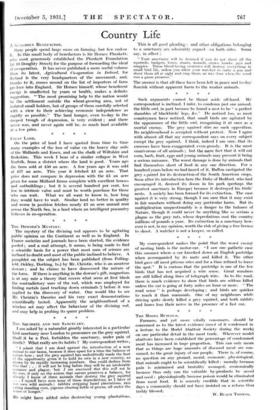THE SQUIRREL AND TILE SANCTUARY.
I amaikeitbya naturalist greatly interested in a particular bird sanctuary near London to pronounce on the grey squirrel. Shall it be a Peri, forbidden the sanctuary, under pain of death? Whit really are its habits ? My correspondent Writes " I admit that I am dead against the introduction of a new animal to our faima, because it does upset for a time the balance of nature here ; and the grey squirrel has undoubtedly made the best of the opportunity. given it to hold its own in a new country, as shown by its rapidlyinereitaing numbers. One could_ deduce from this that ; it will not be long befoie they will be ail intolerable nuisance and plague, 'but - I am convinced that this will not be the case, if only on the axiom that nature preserves a balance, for already I know of three _animals that destroy the grey squirrel • . . r myself have seen none of these depredations, as I have of our own wild online-Is: Febbiti- stripping hizel plantations, rats eating standing corn, pigeons clearinglields of greens, all under the
stress of hunger."• - • . . . _ . •
He might --have lidded -Mice -destroying young - plantations. This is all good pleading ; and other obligations belonging to a sanctuary are admirably argued—on both sides. Some say, in effect : " Your sanctuary will be doomed if you do not shoot all the squirrels, badgers, foxes, stoats, weasels, crows, hawks, jays and magpies. These blood-loving creatures will destroy everything in small bird life, unless you allow your watcher to carry a gun and shoot them all at sight and trap them, as was done when the wood
was a game preserve." •
The answer is that all these have been left in peace and to-day flourish without apparent harm to the weaker animals.










































 Previous page
Previous page